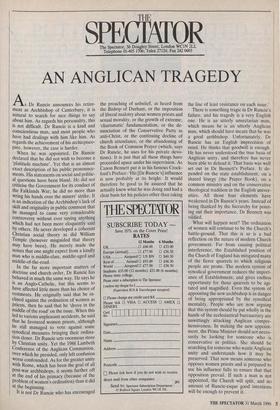SPCTAT THE
E OR
The Spectator, 56 Doughty Street, London WC1N 2LL Telephone 01-405 1706; Telex 27124; Fax 242 0603
AN ANGLICAN TRAGEDY
As Dr Runcie announces his retire- ment as Archbishop of Canterbury, it is natural to search for nice things to say about him. As regards his personality, this is not difficult. Dr Runcie is a kind and conscientious man, and most people who have had dealings with him like him. As regards the achievement of his archiepisco- pate, however, the case is harder.
When he was appointed, Dr Runcie declared that he did not wish to become a `platitude machine'. Yet that is an almost exact description of his public pronounce- ments. His statements on social and politic- al questions have been bland. He did not criticise the Government for its conduct of the Falklands War; he did no more than wring his hands over the miners' strike. It is an indication of the Archbishop's lack of skill and originality in public comment that he managed to cause very considerable controversy without ever saying anything which had not been more eloquently said by others. He never developed a coherent Christian social theory as did William Temple (however misguided that theory may have been). He merely made the noises that one might expect from a kindly man who is middle-class, middle-aged and middle-of-the-road.
In the far more important matters of doctrine and church order, Dr Runcie has behaved in much the same way. He says he is an Anglo-Catholic, but this seems to have affected little more than his choice of vestments. He originally said that he in- clined against the ordination of women as Priests, then he said that he `drove in the middle of the road' on the issue. When this led to various unpleasant accidents, he said that he favoured women priests, although he still managed to vote against some synodical measures bringing their ordina- tion closer. Dr Runcie sets enormous store by Christian unity. Yet the 1988 Lambeth Conference of the Anglican Communion, over which he presided, only left confusion worse confounded. As for the greater unity with Rome, which has been the goal of all post-war archbishops, it seems further off at the end of his primacy (because of the problem of women's ordination) than it did at the beginning. It is not Dr Runcie who has encouraged the preaching of unbelief, as heard from the Bishop of Durham, or the imposition of liberal zealotry about women priests and sexual morality, or the growth of extreme, `charismatic' fundamentalism, or the de- nunciation of the Conservative Party as anti-Christ, or the continuing decline of church attendance, or the abandoning of the Book of Common Prayer (which, says Dr Runcie, he uses for his private devo- tions). It is just that all these things have proceeded apace under his supervision. As Canon Bennett put it in his famous Crock- ford's Preface: 'His [Dr Runcie's] influence is now probably at its height. It would therefore be good to be assured that he actually knew what he was doing and had a clear basis for his policies other than taking the line of least resistance on each issue.'
There is something tragic in Dr Runcie's failure, and his tragedy is a very English one. He is an utterly unsectarian man, which means he is an utterly Anglican man, which should have meant that he was a good archbishop. Unfortunately, Dr Runcie has an English imprecision of mind. He thinks that goodwill is enough. He has never understood the true basis of Anglican unity, and therefore has never been able to defend it. That basis was well set out in Dr Bennett's Preface. It de- pended on the state establishment, on a shared liturgy (the Prayer Book), on a common ministry and on the conservative theological tradition in the English univer- sities. All those four elements have weakened in Dr Runcie's years. Instead of being thanked by the hierarchy for point- ing out their importance, Dr Bennett was vilified.
What will happen next? The ordination of women will continue to be the Church's battle-ground. That this is so is a bad reflection on the nature of modern Church government. Far from causing political interference, the Established position of the Church of England has mitigated many of the fierce quarrels to which religious people are prone. The modern system of synodical government reduces the import- ance of Establishment, and gives endless opportunity for those quarrels to be agi- tated and magnified. Even the system of appointing the new archbishop is in danger of being appropriated by the synodical mentality. People who are now arguing that this system should be put wholly in the hands of the ecclesiastical bureaucracy are unwittingly attacking Anglican compre- hensiveness. In making the new appoint- ment, the Prime Minister should not neces- sarily be looking for someone who is conservative in politics. She should be searching for someone who wants Anglican unity and understands how it may be preserved. That now means someone who opposes women priests and is prepared to use his influence fully to ensure that that opposition prevail. If such a man is not appointed, the Church will split, and no amount of Runcie-esque good intentions will be enough to prevent it.


























































 Previous page
Previous page